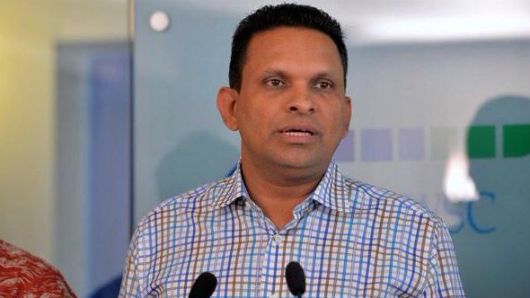The Maldives has urged the world to take reach a strong and legally binding climate change agreement at the 2015 United Nations Climate Change Conference.
Speaking at the plenary meeting of the 20th Conference of the Parties to United Nations Framework Convention on Climate Change (UNFCCC) in Lima Ambassador Ahmed Sareer emphasised on the need for a negotiated text in order to arrive at a strong agreement in Paris in 2015.
“We do not want to be in Paris to get perished,” said Sareer.
The Maldives mission to the United Nations reports that Sareer told the meeting that the Maldives, as a small, low-lying island state, is among the most vulnerable and least defensible countries to the projected impacts of climate change.
Touching on the ongoing water crisis in Malé, Sareer said that the situation “is a stark example of the vulnerability of small island developing states like the Maldives that has no natural fresh water sources”.
A fire in the capital’s only desalination plant left 130,000 people without running water last week, requiring international relief efforts to deal with the crisis.
Unusual in the crowded capital, water shortages have become commonplace in the country’s outer atolls – a combination of periods of drought and groundwater contaminated by the 2004 tsunami.
Noting the recent pledges to the Green Climate Fund – intended to raise $100 billion a year by 2020 – Sareer said: “as a small island developing state that is constantly facing an existential threat, the current pledges are simply not enough”.
The Maldives has recently become chair of the Alliance of Small Island States (AOSIS), while former President Maumoon Abdul Gayoom calling on larger nations to allow vulnerable states to take a lead in climate change policy.
Ambassador Sareer said that the Maldives’ share of global emission is negligible, and that the government of Maldives was striving to make the country resilient.
Former President Nasheed – who gained international acclaim for his efforts at the 2009 climate change conference – recently told the International Bar Association (IBA) that he feared Maldivians could become the world’s first climate change refugees.
“When I was elected president, I caused some controversy by saying we would someday have to leave our islands. I was hopeful then that we would be able to change the way our story ends. But I fear it is too late now for the Maldives,” he told the IBA’s showcase session on climate change and human rights.
The 2015 United Nations Climate Change Conference – or COP21 – will be held in Paris between November 30 and December 11 next year.
The COP21 organising committee has said that: “By the end of the meeting, for the first time in over 20 years of UN negotiations, all the nations of the world, including the biggest emitters of greenhouse gases, will be bound by a universal agreement on climate.”
Related to this story
Maldivians could be among first climate refugees, warns Nasheed
Maldives world’s most vulnerable country to climate-change related impacts on food security
Maldives’ economy hardest hit by climate change: Asian Development Bank

